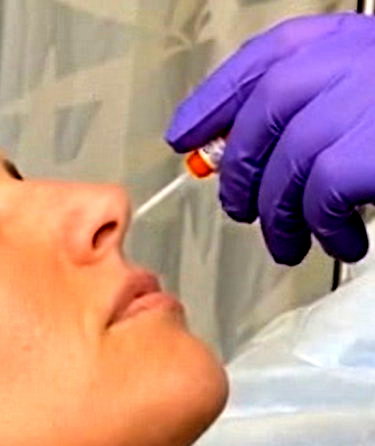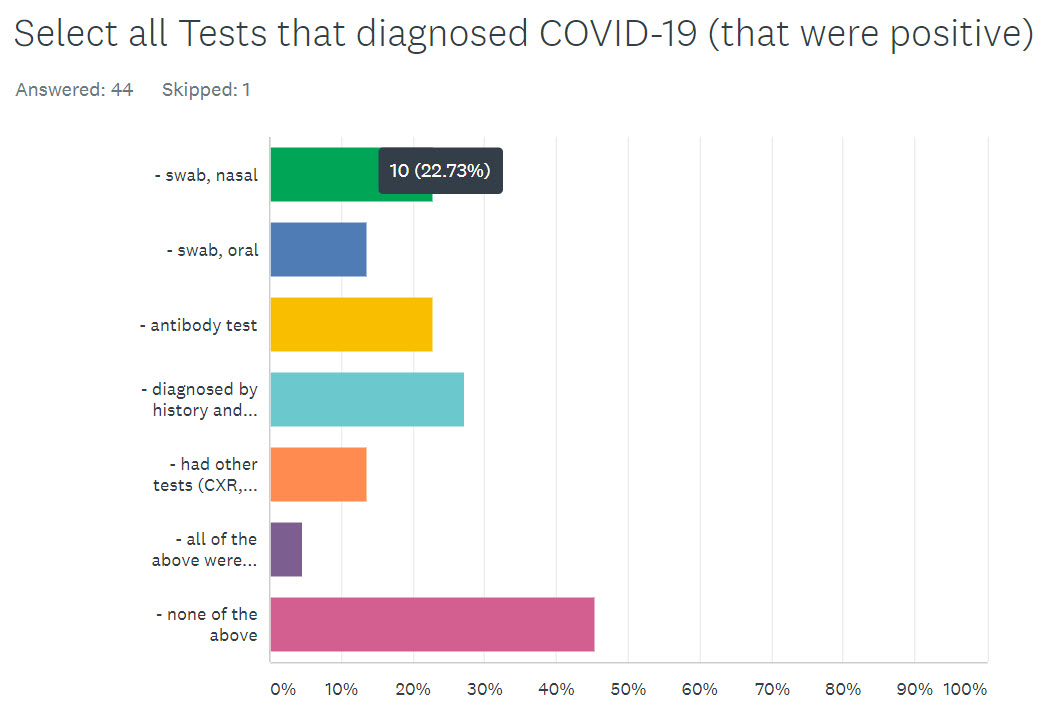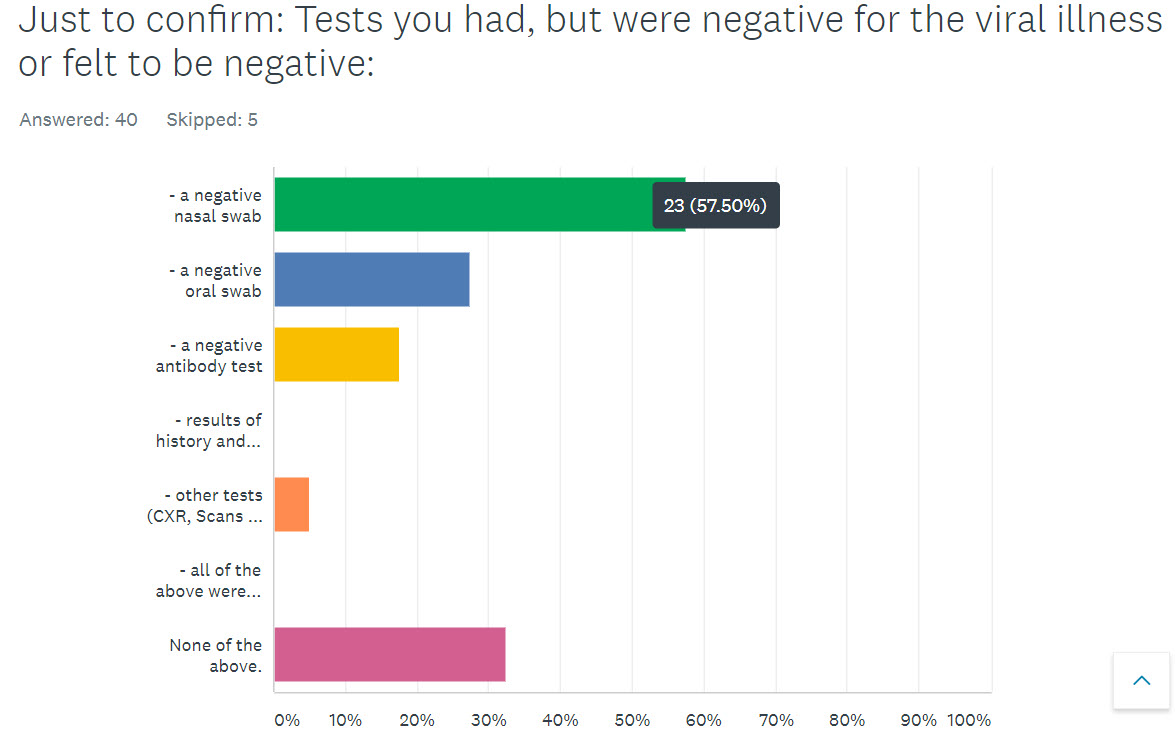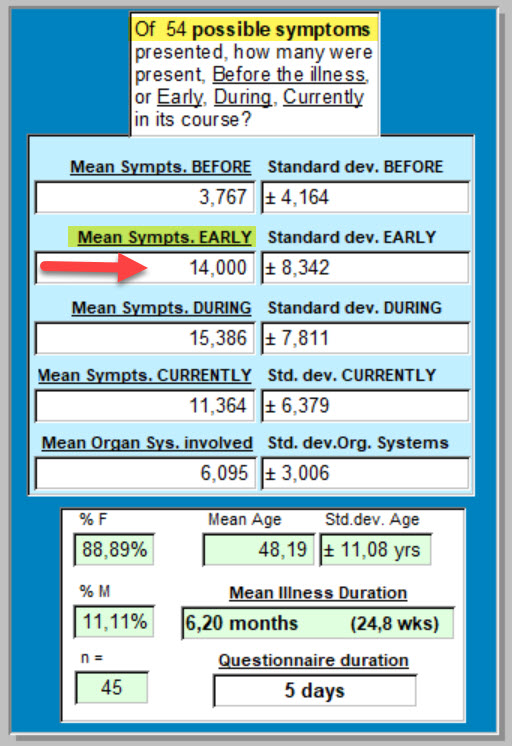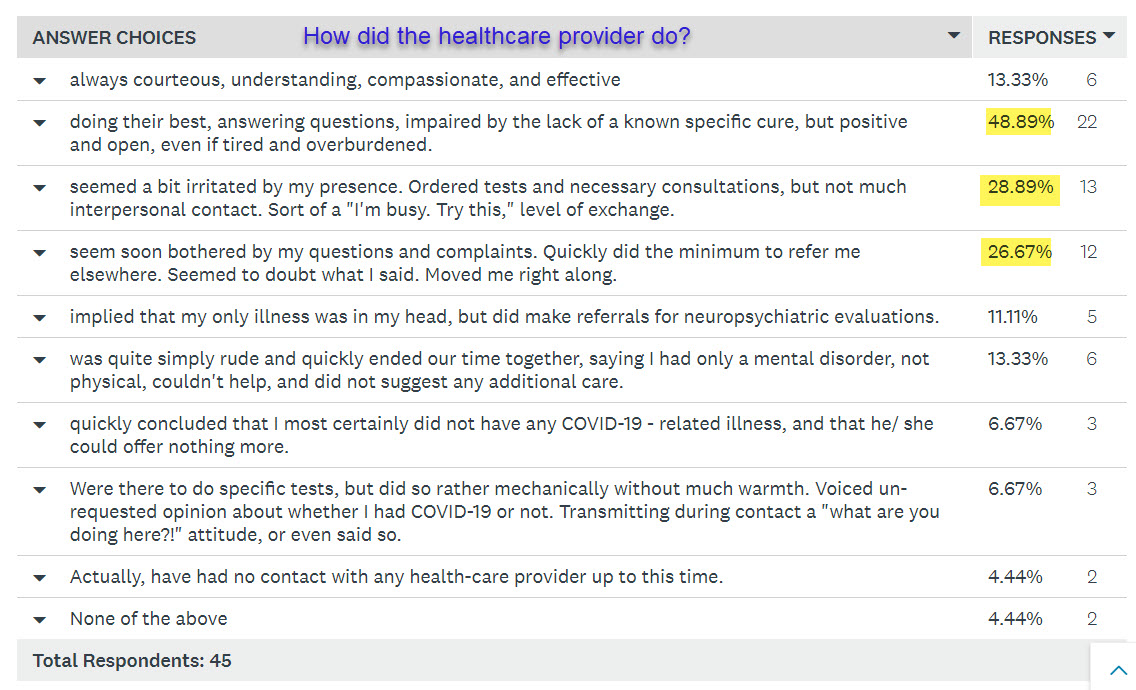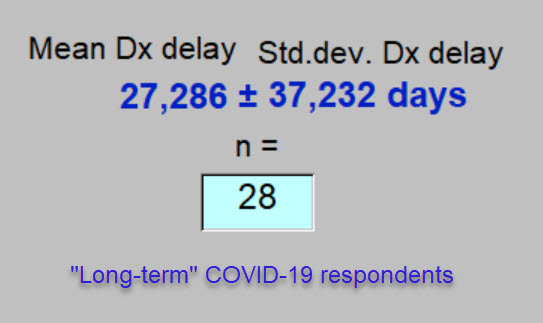Lesson 1: Test results - how uncertainty changes our lives
CallingCOVID.com
Thanks for visiting!
To translate this page, select your
language from the dropdown menu below:
The goal of healthcare is to relieve suffering and heal the sick where possible.
That goal remains the same for those with "long-term" COVID-19 as for any other illness.
How well is that goal being met? If not, where are things breaking down?
Let's look at a few pieces that take us closer to the answer ...
An update to this article, incorporating more responses into the data, is found here.
Who will not recognize this picture today?
But how many would not have recognized it a year ago? Most.
And as unpleasant as it looks, many accept having it done to them.
Even seek it out more and more frequently.
Why?
Because it removes uncertainty from one's life. At least it's supposed to. But, hopefully, not add to it.
You get a little fever, or a dry cough, or fatique and shortness of breath, or maybe some diarrhea and a headache instead ... and after saying "Damn! ... Damn!" You make some calls and seek out on your own, or directed by someone else, to get a skinny baton shoved up your nose. To have it get twisted around and tickle just beneath your brain. Can you imagine? People are begging to get it!
Data 1: tests and results.
So how did that work out for the 45 persons who have answered our Questionnaire as of September 17?
Here are the positive tests :
And here are the tests that were reported as negative:
So today, 57.5% of those responding so far, had a NEGATIVE nasal swab test for viral protein.
If you like numbers and want to see those for the other tests, this little gallery will spin them in front of your eyes.
So only 22.7% of respondents had a positive test, and 57.5% had a nasal swab, which was negative for viral proteins. That's the performance for those who answered, of this Golden Standard test.
In French we might say: "Pas fameux ..."
How should we take this result if we're the doctor?
"Hello? Ms. Jones ? Good News! You're nose swab test was negative. You don't have this virus. Isn't that great?!" ...
How should we take this if we're the patient?
"Oh thank you Doctor! Good news. I was starting to worry because I hadn't heard anything. So I don't have this virus. Great! And thank you so much, doctor.
Oh, and one last thing doctor. What do I have? Why am I sick?"
Doctor: "Well, I mean ... what are your symptoms?"
( Patient gets out her list ...)
And here is her list. We have it now.
Symptom Count at various times in the "long-term" COVID-19 illness.
(At his end of the phone line, the Doctor is counting as the Patient reads her list ...).
Doctor: "Jesus! ... you have 14 different symptoms that don't even seem related! Is that what you want me to believe?! I mean, ... that is most unusual. I mean, ... what are you? Crazy or something?! Do you watch the news on TV? The NEWS is probably just contributing to your anxiety. Do you feel anxious?!"
(After a pause...) "Oh excuse me. I should have said: "maybe we should do some more tests. Maybe you should call me back in a week or 10 days and let me know how you're getting on. Let's do that. If you're still not better, we'll just have to do some more tests. Sound like a plan? ..."
Patient: "Thank you Doctor. OK I'll call back."
All of these phrases in quotes are mine, not results from the questionnaire!
And I think (and hope) that most physicians would not have projected such a reaction, even if actually thinking it. Compassion in medical care is not yet dead, even if not perfectly healthy today.
Why would that exchange happen like that?
Because the doctor, no matter how much she or he likes challenges, usually actually prefers a different situation. Something a little more clear cut. Something where the doctor, through a correct diagnosis, can be the conquering hero. Yet once again.
Something like this:
Patient presents with a Chief Complaint of "leg pain." A History is obtained: " I fell down the stairs." An exam is performed: "Right leg deformity, point tenderness at the hip, with shortening and external rotation of the extremity, bent at the knee, and a reduced posterior tibial pulse at the ankle."
Doctor speaks: "I believe, Ms. Swathmore, that you have broken your leg. Let's get an X-ray to confirm that fracture. Don't worry, if you do have a broken bone, and I'm sure you do, we'll take care of it. If I'm wrong, you have a dislocated hip. But I'm seldom wrong about these things. You'll be all better soon. Now let's get you something for pain, because that must hurt a great deal."
A physician, in whatever domaine of practice, loves to be able to say such things to a patient.
Just loves it. Sucks it up. It's probably why many stay in practice when the practice begins to suck.
When their vocation is up against reality.
So the Doctor didn't at all like this COVID-19 exchange.
Why?
Data: A negative test for the illness. A patient with 14 seemingly unrelated symptoms.
And an exam that is being done at a distance by telephone.
And if "she has it," "how ya gonna kow?" and "how ya gonna treat it?"
That equals: Uncertainty. No position on the Podium of Doctorly Excellence today.
How about the patient?
Well the patient doesn't have a crystal ball to see how this is going to work out (the doctor neither for that matter). In this little scenario she is presenting early in her illness.
She really doesn't know what to expect. She does know she's not feeling well.
But that test in the nose...
That test that the media and everyone have placed in the position of The Holy Grail.
Well, ... hers is negative. And with its position at the center of testing, ... placed there by published reports, and the doctors, and the nurses, and the technicians in the ER and lab, and the NEWS papers, and Channel 5 News, and Twitter, and Facebook, and the neighbot who had one and her's was positive.
It's The Holy Grail of testing for COVID-19. "And yours was negative? ... Oh. ... I see."
That equals: Uncertainty. "I'm sick. Do these guys know what they're doing? Did they do the damn test right?!"
-------------
Here is what she doesn't know yet ...
- Here illness is likely to last 6.2 months (before somebody pops up and asks her to complete a questionnaire).
- During this illness, she will experience 15 symptoms, of varying severity on most days.
- At the time she answers the questionnaire (24.8 weeks after her illness began) she still has 11 different symptoms that she is living with daily. So there is some improvement. Of course, 11 spots that are sore or scratchy or turning colors, or making her clumsy and confused ... 11 is still a lot of symptoms.
And that is what she has awaiting her. While the doctor is briefly explaining that she doesn't have :
The Holy Grail, the winning test result. But he did suggest that a continued pursuit of this illness is possible if necessary, eventually.
But it might just get on her nerves and her emotions eventually: The Uncertainty.
Parenthetically, many individuals throughout the world in this time of pandemic, are also learning about living with new levels of uncertainty. Even if presenting no apparent symptoms. But most have not completed a questionnaire on the topic.
(To be discussed at some other time in another article).
And if she had to give her opinion about that exchange about her negative nose swab, what might she be thinking? What did she notice? What "vibes" reached her over the phone lines? What would she say about it?
We've got that: Here are the data so far ...
(click to enlarge if needed)
I appreciate that 13% of respondents clicked to indicate that things seemed perfect.
But I have highlighted that frequently, the exchange had some difficulties. The person responding could click on several of these options. So the exchange could have been "courteous... and compassionate" but at the same time a medical visit that was a "seeming irritation" for someone seemingly "tired and overburdened."
Follows here, one example, at the extreme end of the spectrum, I assume. But who knows?
From the questionnaire ... From a respondent. Not my words:
"You didn’t know enough. I don’t blame you for that. But you didn’t try hard enough to learn from emerging sources. I blame you for that. You were overworked. I don’t blame you for that. You didn’t make sure I was checked on and you left my loved ones to support me on their own. I blame you for that. You made light of my suffering. That hurt. I will never trust the NHS again. I will do everything I can to never have to talk to healthcare professionals for the rest of my life."
Well, obviously, that does not reflect a good result. A plan for no further contact with "the healers," ever again in your life. ... gulp.
Now of course, not every person in the world with so-called "long-term" COVID-19 answered my questionnaire. I wish they would! Then again, that may increase my workload significantly.
But over time, with more responses, a more accurate representation of these exchanges, designed to be healing, ... should emerge.
----------
I did not send a questionnaire to the Doctor. I didn't even call her up to get her side of the story.
She/ he might have a good explanation for why the exchange was displeasing on both sides of the phone conversation. An explanation why "relieveing suffereing and healing the sick where possible," didn't happen.
There could be many parts to that. Here's one offered below. Then we'll wrap this up to avoid overwhelm.
----------
If a person has appendicitis, and doesn't get evaluated and treated for, let's say 7 days, it is very likely that the appendix will have perforated, will have formed an abscess if the patient is lucky, and the patient will usually be very sick.
Getting an appendix out at 3 days after symptoms began is common. A delay of 3 days.
So for appendicitis, a diagnostic delay is bad. It leads to a delay in treatment and complications of the patient's health that are frequently not negligible.
What about delay of Diagnosis (Dx) with COVID-19?
Does it lead to more morbidity, complications of disease, even mortality, or perhaps a prolonged course of illness?
That's a bit of a slippery slope.
Unlike in appendicitis, there is no speciific treatment known. Vaccination is not the issue here.
But in general in Medicine, the sooner one diagnoses the illness, the sooner treatment begins, and the better the patient does to have that become a thing of the past. It's just like that. From appendicitis, to pneumonia, to a broken wrist bone.
To understand the Doctor's job, I suggest we all focus less on tests, and treatments and getting a percription refilled.
The job of paramount importance is naming the disease. That name is called the diagnosis.
In the USA, one of the primary reasons doctors get sued is for "Failure to Diagnose." It constitutes negiligent care.
So, what is the Delay of Dx for the respondents to the questionnaire so far?
Today, 28 of the 44 respondents provided both dates: for when their symptoms began, and when they were diagnosed by whatever means. That number of answers will increase over time. (Already has as I write this, I just noticed ! )
Here are the data:
Answer ? : 27 days.
27 days of not feeling well, before someone calls to say: "Your test was positive. You have COVID-19."
No, I did not say that it took 27 days to get a test result. From "I don't feel well," to "You have the virus, and it's what's making you sick: 27 days.
That should seem long to everyone involved. A "Long-term" delay of diagnosis.
Some will find, and I'm among them, that that is ridiculously long.
The standard deviation of 37 days informs that there is lots of variability in this delay. But let's stay focused on that mean value of 27 days.
The imaginary Doctor who saw the above imaginary Patient, may respond: "Well listen, ... if they don't come in, what the hell can I do?!" He may have a point.
So think with me about all the things that have kept these patients from presenting sooner:
-
-
- fear and anxiety about going to the place where tests are done.
- fear and anxiety about picking up the virus at the test site if one doesn't already have it.
- just feeling crummy, and not wanting to get dressed, drive somewhere while being short of breath; even worse with a mask on.
- confusion and various opinions in the media about whether a person who's not already hospitalized or in the ICU should even have a test.
- incorporating early reports that this "flu, ... doesn't last very long," ... so just wating out its resolution on its own.
- lack of adequate tests, reagents in the lab, machines, PPE, locations to do the test, tests at home, etc.
- lack of support from family, those at work, advisors, etc, for doing whatever was going to give the diagnosis. Why? Ask them. Often to help deny the thought that you might be sick. If a heart attack is "all in your head," you may die from it less quickly.
- ... you can use the space provided to imagine the rest of the reasons for delay: ____________.
-
So did this delay of diagnosis contribute to the evolution of this viral illness into "Long-term COVID-19"?
How would you know?
By reducing that delay. Then following to see if the incidence of "Long-term COVID-19" diminishes or not. What if it just disappeared?
Enough for this article (if not already too much!)
But we'll be back with more comments and anlysis of results from the questionnaire.
Already lots of things attracting this "healthcare provider" 's attention.
Keep those questionnaire responses coming!
Once again, here's the link to our questionnaire.
<<<<<<<< Home
<<<<<<<<<<< Introduction to the Questionnaire
<<<<<<<<<<<<<< Page where we gather all the articles like this one
A découvrir aussi
- Lesson 2: So what about that weight gain?
- Lesson 4 : "long-term" COVID-19 How scary is that?
- Lesson 5: Fostering resilience

